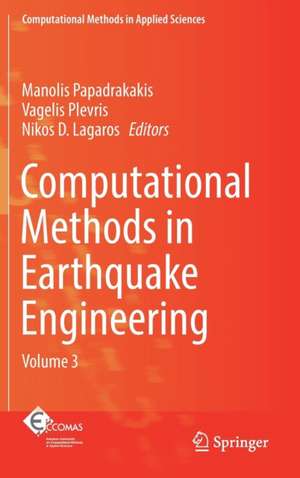Computational Methods in Earthquake Engineering: Volume 3: Computational Methods in Applied Sciences, cartea 44
Editat de Manolis Papadrakakis, Vagelis Plevris, Nikos D. Lagarosen Limba Engleză Hardback – 4 ian 2017
This volume will facilitate the exchange of ideas in topics of mutual interest and can serve as a platform for establishing links between research groups with complementary activities. The computational aspects are emphasized in order to address difficult engineering problems of great social and economic importance.
| Toate formatele și edițiile | Preț | Express |
|---|---|---|
| Paperback (1) | 646.94 lei 6-8 săpt. | |
| Springer International Publishing – 7 iul 2018 | 646.94 lei 6-8 săpt. | |
| Hardback (1) | 653.33 lei 6-8 săpt. | |
| Springer International Publishing – 4 ian 2017 | 653.33 lei 6-8 săpt. |
Din seria Computational Methods in Applied Sciences
- 15%
 Preț: 655.27 lei
Preț: 655.27 lei - 15%
 Preț: 651.51 lei
Preț: 651.51 lei - 15%
 Preț: 657.73 lei
Preț: 657.73 lei - 5%
 Preț: 709.87 lei
Preț: 709.87 lei - 18%
 Preț: 1116.26 lei
Preț: 1116.26 lei - 18%
 Preț: 947.35 lei
Preț: 947.35 lei - 18%
 Preț: 1224.54 lei
Preț: 1224.54 lei - 18%
 Preț: 952.89 lei
Preț: 952.89 lei - 18%
 Preț: 947.35 lei
Preț: 947.35 lei - 20%
 Preț: 653.38 lei
Preț: 653.38 lei - 18%
 Preț: 954.45 lei
Preț: 954.45 lei - 15%
 Preț: 638.76 lei
Preț: 638.76 lei - 18%
 Preț: 1005.74 lei
Preț: 1005.74 lei - 20%
 Preț: 648.59 lei
Preț: 648.59 lei - 18%
 Preț: 954.45 lei
Preț: 954.45 lei - 20%
 Preț: 640.19 lei
Preț: 640.19 lei - 18%
 Preț: 1231.16 lei
Preț: 1231.16 lei - 24%
 Preț: 789.36 lei
Preț: 789.36 lei - 18%
 Preț: 946.41 lei
Preț: 946.41 lei - 20%
 Preț: 567.62 lei
Preț: 567.62 lei - 15%
 Preț: 639.25 lei
Preț: 639.25 lei - 18%
 Preț: 952.57 lei
Preț: 952.57 lei - 15%
 Preț: 636.80 lei
Preț: 636.80 lei - 15%
 Preț: 650.69 lei
Preț: 650.69 lei - 18%
 Preț: 952.26 lei
Preț: 952.26 lei - 18%
 Preț: 1239.99 lei
Preț: 1239.99 lei - 5%
 Preț: 716.65 lei
Preț: 716.65 lei
Preț: 653.33 lei
Preț vechi: 768.62 lei
-15% Nou
Puncte Express: 980
Preț estimativ în valută:
125.07€ • 130.50$ • 104.84£
125.07€ • 130.50$ • 104.84£
Carte tipărită la comandă
Livrare economică 13-27 martie
Preluare comenzi: 021 569.72.76
Specificații
ISBN-13: 9783319477961
ISBN-10: 331947796X
Pagini: 435
Ilustrații: X, 418 p. 182 illus.
Dimensiuni: 155 x 235 x 24 mm
Greutate: 0.78 kg
Ediția:1st ed. 2017
Editura: Springer International Publishing
Colecția Springer
Seria Computational Methods in Applied Sciences
Locul publicării:Cham, Switzerland
ISBN-10: 331947796X
Pagini: 435
Ilustrații: X, 418 p. 182 illus.
Dimensiuni: 155 x 235 x 24 mm
Greutate: 0.78 kg
Ediția:1st ed. 2017
Editura: Springer International Publishing
Colecția Springer
Seria Computational Methods in Applied Sciences
Locul publicării:Cham, Switzerland
Cuprins
Preface.- 1. Numerical Modeling Aspects of Buried Pipeline – Fault Crossing, by Vasileios E. Melissianos and Charis J. Gantes.- 2. Determination of the parameters of the directivity pulse embedded in near-fault ground motions and its effect on structural response, by Petros Mimoglou, Ioannis N. Psycharis and Ioannis M. Taflampas.- 3. Numerical Simulation of Liquid Sloshing in Tanks, by Zuhal Ozdemir, Yasin M. Fahjan and Mhamed Souli.- 4. Seismic Analysis of Structural Systems Subjected to Fully Non-Stationary Artificial Accelerograms, by Giuseppe Muscolino and Tiziana Alderucci.- 5. Elastic and Inelastic Analyses of Frames with a Force-based Higher-order 3D Beam Element Accounting for Axial-flexural-shear-torsional Interaction, by João P. Almeida, António A. Correia, and Rui Pinho.- 6. Improved Method for the Calculation of Plastic Rotation of Moment-Resisting Framed Structures for Nonlinear Static and Dynamic Analysis, by Kevin K.F. Wong and Matthew S. Speicher.- 7. Seismic demandon acceleration-sensitive nonstructural components, by Gennaro Magliulo, Crescenzo Petrone and Gaetano Manfredi.- 8. Design of RC Sections with Single Reinforcement according to EC2-1-1 and the Rectangular Stress Distribution, by Vagelis Plevris and George Papazafeiropoulos.- 9. Multi-Storey Structures with Seismic Isolation at Storey-levels, by Marios C. Phocas and George Pamboris.- 10. Integration step size and its adequate selection in analysis of structural systems against earthquakes, by Aram Soroushian.- 11. Seismic fragility analysis of faulty smart structures, by Yeesock Kim and Jong-Wha Bai.- 12. Actuating connections for substrusture damage identification and health monitoring, by Stavros Chatzieleftheriou and Nikos D. Lagaros.- 13. Fuzzy Neural Network Based Response of Uncertain System Subject to Earthquake Motions, by S. Chakraverty and Deepti Moyi Sahoo.- 14. Smart control of seismically excited highway bridges, by Yeesock Kim and Aniket Anil Mahajan.- 15. A Real-Time Emergency Inspection Scheduling Tool Following a Seismic Event, by Nikos Ath. Kallioras and Nikos D. Lagaros.
Textul de pe ultima copertă
This is the third book in a series on Computational Methods in Earthquake Engineering. The purpose of this volume is to bring together the scientific communities of Computational Mechanics and Structural Dynamics, offering a wide coverage of timely issues on contemporary Earthquake Engineering.
This volume will facilitate the exchange of ideas in topics of mutual interest and can serve as a platform for establishing links between research groups with complementary activities. The computational aspects are emphasized in order to address difficult engineering problems of great social and economic importance.
This volume will facilitate the exchange of ideas in topics of mutual interest and can serve as a platform for establishing links between research groups with complementary activities. The computational aspects are emphasized in order to address difficult engineering problems of great social and economic importance.
Caracteristici
Edited and written by leading experts with great reputation and experience in this scientific field Represents state-of-the-art methods and concepts in earthquake engineering Combines of computational methods and their application in the seismic design and the analysis of structures Includes supplementary material: sn.pub/extras
